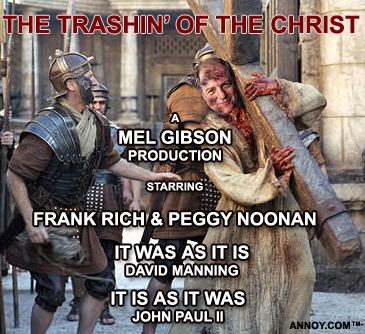 Mel Gibson’s marketing strategy behind his controversial film, The Passion of the Christ, appears to have taken a page from the Sony Entertainment playbook. Mel Gibson’s marketing strategy behind his controversial film, The Passion of the Christ, appears to have taken a page from the Sony Entertainment playbook.
You may recall the furor that arose following revelations that a certain film critic, David Manning, who had been lavishing praise on movies, notably Patriot Games II, starring Mel Gibson, turned out to be a fabrication – cut from the same imagination that turned Gibson, a former shampoo model, into a macho, jingoistic hero.
Semantics are important. President Clinton famously parsed the meaning of the word is, following a moral witch hunt reminiscent of The Inquisition, and so it comes as no surprise that the same word has, once again, been abused and misappropriated by those seeking martyrdom and revenue simultaneously.
Self righteous former Reagan speechwriter and Wall Street Journal columnist was among many who took at face value, word from the Gibson camp regarding Pope John Paul II’s reaction to The Passion of the Christ. The Pontiff, she claimed, watched a DVD copy in his private quarters at the Vatican, accompanied by his personal secretary, Monsignor Stanislaw Dziwisz, and supposedly said: “It is as it was”. Concluded Noonan: "The film, the holy father felt, tells the story the way the story happened. A week later Mr. [the film's co-producer, Steve] McEveety was marveling at what he felt was the oracular quality of the statement. 'Five words. Eleven letters.'" As translated into English, mind you.
Never mind what is may be. It also depends what it was and what was is, and what is is now.
Once word got out that Mr. McEveety, had turned the Pope into a cheap movie critic, the Vatican, uncomfortable at the media coverage and extent to which the Pope had been exploited, quickly disputed the claims. "The Holy Father told no one his opinion of this film," Archbishop Stanislaw Dziwisz told the Catholic News Service. Crystal clear. Eleven words. (Had he used "He" instead of "The Holy Father" and droppped "of this film," he might have achieved the same profundity attributed to the Pontiff himself. Six words, one unambiguous meaning. Or better yet, two words: "They lied.")
The refuting of the claim, however, did not stop the Gibson marketing machine from capitalizing on the Pontiff’s words. Within moments, the Pope's review was available as HTML and flash banner advertisements, flashing the "five word, eleven letter" phrase to be perpetuated and plastered across web sites globally. And while the statement appears to have been hastily removed from posters and other materials available on the offcial web site, the tasteless publicity stunt at the Popes expense, should give immediate pause to anyone holding a grudge against Janet Jackson.
Given the seemingly demented ranting of Gibson’s father, Hutton Gibson, whose books and statements have been highly critical of the Vatican as having strayed from strict interpretations (or misinterpretations) of the bible -- not being Catholic enough -- and the old Holocaust denial dance, it comes as no surprise that the filmmaker would use the Pope, spreading lies in his name, to suggest, ironically, that he considers their film version of the death of Christ the truth.
While Mel Gibson deserves the right to express his opinions, be they anti-Semitic, homophobic and any of the other charming attributes he carries, his “some of my best friends are Jewish” shtick seems a tad shallow if he’d knowingly smear the Pope. And allegedly threaten to kill New York Times columnist, Frank Rich, for pointing out the Emperor's wardrobe deficiencies. "I want to kill him," Gibson said, as reported in The New Yorker and Rich's own column, "I want his intestines on a stick. … I want to kill his dog." And, after all, serial killer and cannibal, Jeffrey Dahmer's best friends were kids. While Gibson’s ability to stir controversy and media attention over the film is pretty remarkable, there is an inherent failure in the overall public relations strategy, which boils down to the fundamentals of marketing.
Why would anyone want to see a movie positioning itself as the true story of a selfless, altruistic martyr dedicated to peace and truth when the storyteller seems to be a vain, violent, conniving, money-hungry, selfish liar?
|


